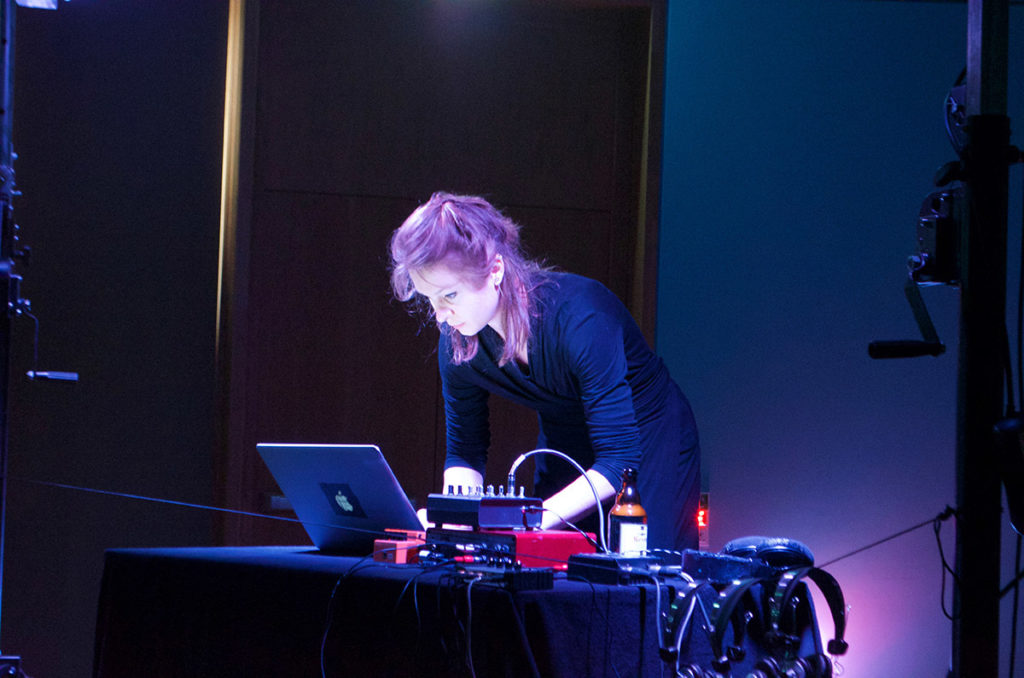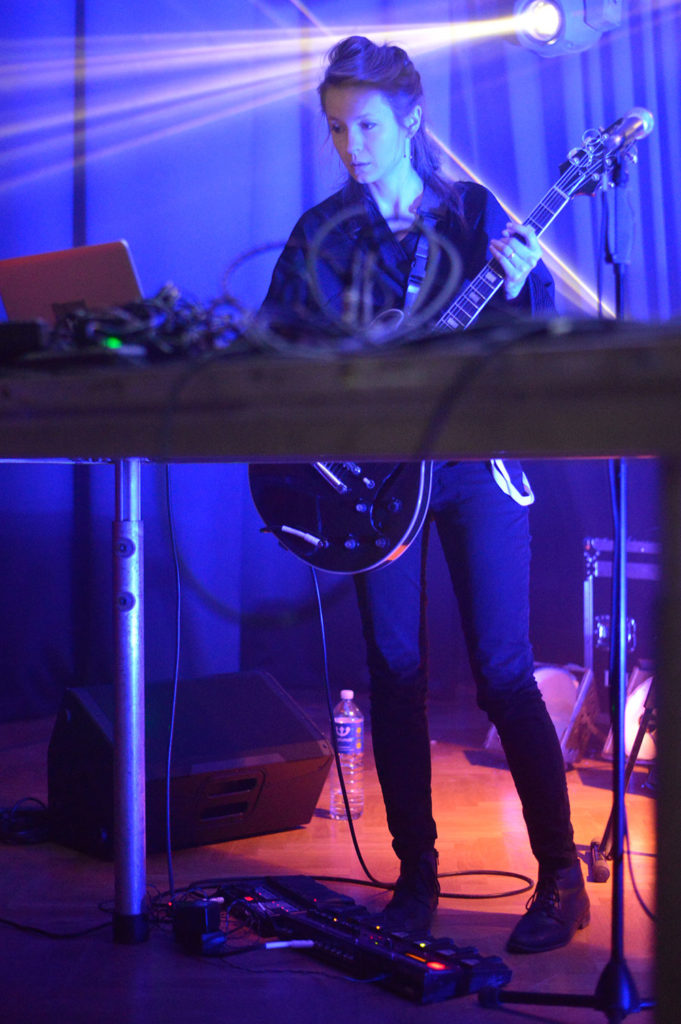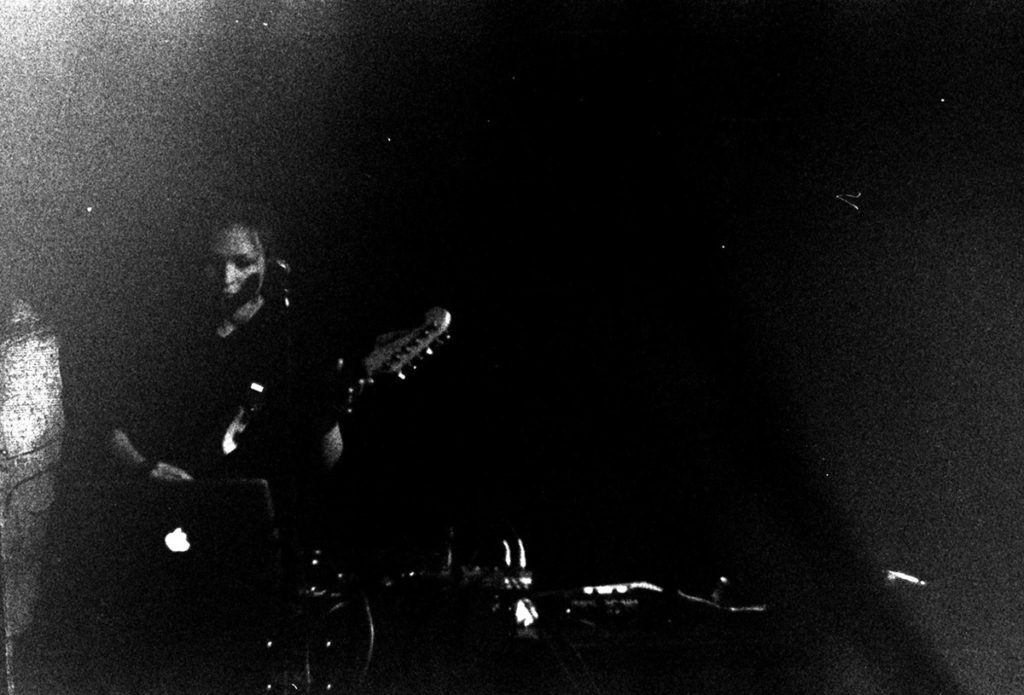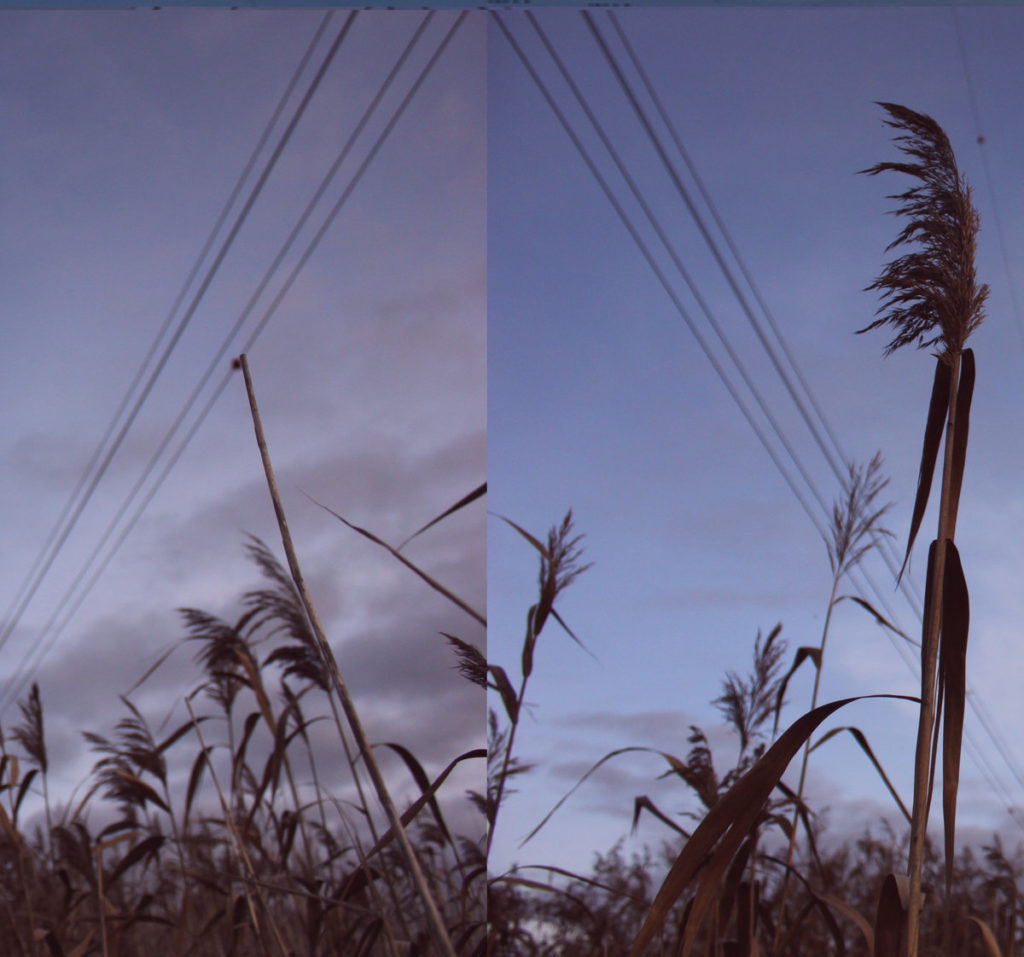
I became acquainted with Daina Dieva’s artistic activity relatively recently. What drawn me into it for a while was the palpable sincerity in her work and the courage to externalize her sensitivity. The intimacy of expression coincides with mystery, loops and heads in a new direction.
Daina Dieva is a perfomance author, (as she calls herself) sound designer, curator of cultural events. Her work is about exploration and discovery in the musical realm using guitar effects, drones, noise, experimenting with field recordings and many other means. This specific concoction often gives surprising results.
I had the pleasure to talk to her about all this as well as about the Lithuanian scene. Read and listen to her and be transported into her world.
Artur Mieczkowski
Artur Mieczkowski: Can you tell me about your beginnings with artistic endeavours? Was it music or perhaps something else?
Daina Dieva: I think the beginning was some sort of a mixture of my interest in documentary filmmaking, experimental video and experimental sound, all more or less at the same time. Later the territory expanded into making sound for performance, then into making and curating performance, and for some years now I do mostly sound. I like the ephemerality of this medium. The way you can reach out towards the others via sound is unique – it is visceral & beyond language, it affects you regardless of what you’ve read and where you came from.

AM: Your first music album is Daina Dieva & Svart1 – Incubi-Succubi released in digital form, under the Clinical Archives label. What musical areas were you exploring at that time?
DD: Wow, that takes me back to 2008/2009. That composition was done for the opening of the exhibition by Sardinian artist , a really talented human, which along with his partner Mara Lasi are this legendary CMI band “Medusa’s Spell”. Daniele is exploring this gorgeous dark fantasy world of mythical beings (here’s what I’m talking about), many of them female characters. So myself and Svart1 were sort of working to resonate that universe, I guess. The character of the text I wrote is a female that kills the person she loves and then sings him a lullaby.
AM: The next album “Nakčia” (“In the night”) also wasn’t released in physical form, and it tells a very interesting story. Could you tell me about it?
DD: Firstly as to the form – physical form of an album is not very important to me. I mean, I’ve spent quite a bit of my life living in different places with two backpacks only – one for clothing, the other for instruments & my PC. For years there literary was no space for physical forms in my life. So netlabel releases were perfect. Also netlabels and the internet as an archive of knowledge and a place for learning and exchange, – that was and still is amazing to me. I wouldn’t even know how to explain this to people that are born with internet and connectivity as their normality, what things like Myspace were to me all those years back. That shift and that access really opened the world of sound for me, which before I saw as fragmented and somehow beyond my reach.
“Nakčia” was my first solo live that I later recorded. My techical skills were really mediocre by then, so I really appreciated the help of Seetyca to make it sound like it does. As to the story of hermaphrodite suns that devour each other – that is all there is really. These are visions that come once I start working with sound and writing. I could come up with some conceptual explanation, but to tell the truth, I don’t know what they are. They just are that.
AM: You use a plethora of interesting instruments, humms, noises, drones, you make use of field recordings. Where do you find inspiration for your work?
DD: I don’t believe in inspiration. For me soundmaking is a sort of a tool to understand things – within myself or within (or outside of) the world. It is my way of dealing with fear, pain, grief and many things beyond language. So it comes from many places. And as to creative process – I just sit down and play, and then some shapes appear, and then some are discarded, some stay to be worked on etc.
As to the soundform, I am really influenced by many genres and by a variety of music culture(s) I grew up within, inluding choir, chamber music, metal and others. However, to what extent do they translate into my work as a sound maker is another question altogether.

AM: You also describe your music as post-folk, which relates to songs and paintings from Lithuanian folk tradition.
DD: This tag relates well to some of the texts I write. Also probably helps people understand what to expect or what some of my sonorities are. I am not sure though if it reflects well some of my most recent work. For example, the sound compositions I do for contemporary dance are more noise, drone, sometimes techno even.
AM: Instead of the term “musician” you prefer “sound constructor”. Indeed, listening to your albums one can get an impression that these recordings are stories.
DD: I think I am in general ashamed to use “musician”, I always feel it somehow is reserved to someone having a formal music education. And I have learnt so many things basically by dragging along, observing others, making mistakes, watching tutorials, reading stuff.
Anyway, yea, it’s great if they feel like stories, most of them are. Some of them are extremelly personal stories, some of them are born from my relating to things of/in this world. For example “Leaving the Garden” is about escaping a very dark place, a place I felt I am at, a place of anguish and fear and depression. “Budynės” is a story about the silencing of the world – the climate catastrophe we’re experiencing, and the cultures of death and dying. So lots of anguish too, but such that is beyond me and is in many ways shared.
AM: How much your latest material, “Gedulo vartai” departs from what you were presenting on your first releases? How far did your thinking about creating, or constructing sounds, evolved?
DD: For one, technically I am doing way better on this one than in 2009. Conceptually, “Gedulo vartai” is, again, coming from a very personal place, a pretty dark one: that of anguish, guilt, hurt, emptyness.
The work on this album was me trying to come to terms with the suicide of someone that was very important to me. Therefore it was a very meticulous work, even ritualistic. Even the physicallity of the release was extremelly important to me – I wanted to hand-cut all of those cardboard boxes, I needed to prepare all of it by hand, number and fold them one by one. It felt like part of my grieving.
So to answer your question, I feel that each album is extremelly different and yet similar in so many ways. The thing that has changed most, over the years, is how I feel about my voice and what place I assign to it in the composition. Whereas in most of my previous work I was putting it as far as possible, as low as I can, shapeless, often feeling disturbed by how rough and weird I sound, these last years I let it emerge, take its space in the composition.
AM: Apart from creating music, you are also a curator of various cultural events.
DD: My curatorial practice goes hand in hand with the artistic one. I used to curate an international performance art festival for several years, now I curate an industrial culture platform. For me this practice makes sense as long as it can serve to create spaces of sharing.
AM: You performed at WROCLAW INDUSTRIAL FESTIVAL. How was it? Did you have any other occasion to perform in our country?
DD: I played in a tiny venue in Wroclaw year before performing in WIF. It was not a very successful gig as promoter basically did not promote us. It was four of us that year travelling on a mini tour – myself, “Skeldos”, “Orchach” and “Obšrr”.

AM: You release your records also on your own. Is it easier that way? Is it also about having control over the visual aspects and the quality of the physical release itself?
DD: I think most of the times I just lack the patience to send things around. Other times I just feel that if I don’t put this thing out right now, the moment will pass and I will not have the courage to release it. Then there are other times – for example “betylės erdvės” became a hybrid piece of work: I was making a sound installation in a gallery, but it was the pandemic, and I was looking for a form to make it accessible. And online mini-album was just a solution I needed.
AM: Considering Lithuanian scene with this kind of music, i’m finding recordings from Apport! – i admit, very interesting. Could you bring your scene a little bit closer?
DD: Most of us in the Lithuanian scene are to some extent proud of it – we are not exactly numerous, but the quality is really great, and not only technically. “Apport!” is putting out some great sounds, I am so happy they started the label. You could also check out “Ghia” collective’s work. Earlier “Terror” ( ) has been active in putting out some really harsh stuff. You might be familiar with the label “Autarkeia” which also used to also organize gigs years back. Some good music has been released by “Dangus” . “Suru records” label is sort of trying this territory out (especially with the latest release by “Nulis:s:s:s”) but they don’t yet have an acoustic identity that would help me identify them as the label of that what I imagine could be called industrial scene, I think. A year or so back a completely new label “Amulet of Tears” https://amuletoftears.bandcamp.com/ started out. As to more experimental stuff, “Electron Emitter” is to be mentioned. And surely there’s still things I am forgetting atm as well as numerous individual artists – among which I think a special mention should go to Skeldos, a great friend of mine, but listing all of those worth listening to would be a night’s work. All in all, there’s quite some things going on, which I am really happy about. I would, of course, like to see more women and queer artists in our scene, but it is not only a local issue.

AM: Daina – nomen omen – in Lithuanian language means “song”. Do you consider it as some kind of fate:)?
DD: I most definitely do :).
AM: What do you work on at the monent? When can we expect some new material?
DD: Since the Russian invasion to Ukraine I have not had much creative energy for music – it seems like it is ought to flow someplace else.
But something is coming up, regardless, in a form of a collaboration with a couple of musicians I appreciate a lot, and I hope to have news about it fairly soon and communicate it via my bandcamp.
AM: Thank you for your time, and best wishes in realisation of your plans.
DD: Thank you, Artūrs, for listening and for your interest!